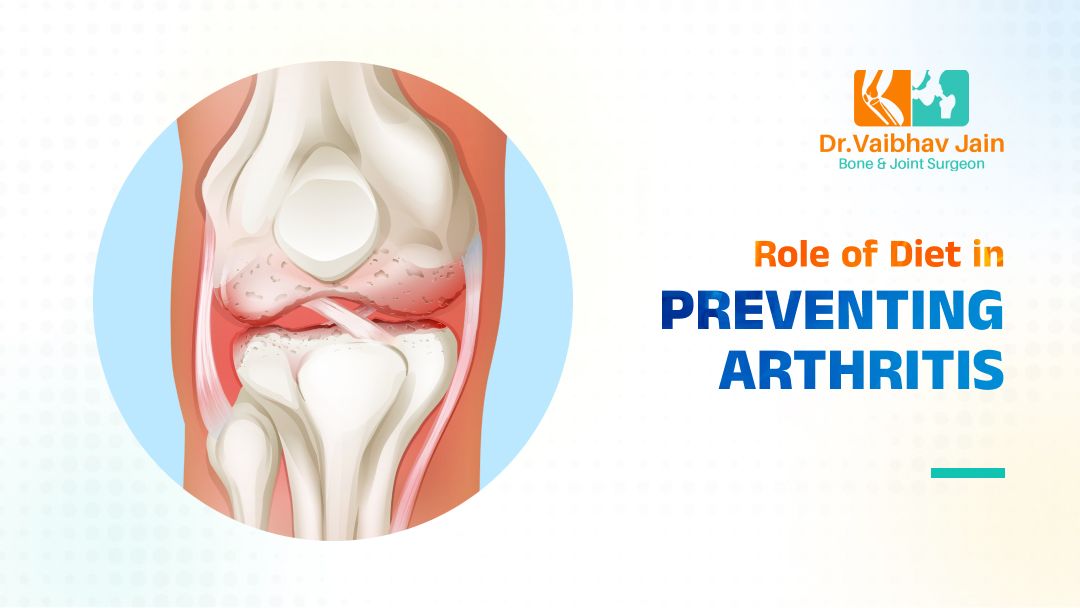Arthritis affects millions of people, causing pain, swelling, and trouble moving joints. While many treatments exist, Role of Diet in Preventing Arthritis. What we eat can greatly impact our joint health.
Understanding Role of Diet in Preventing Arthritis
Types of Arthritis
Arthritis is a term for over 100 types of joint pain and disease. The most common types are:
- Osteoarthritis: Wear and tear on joints.
- Rheumatoid Arthritis: An autoimmune disorder.
- Gout: Caused by uric acid crystals in the joints.
Symptoms of Arthritis
Symptoms include:
- Joint pain
- Stiffness
- Swelling
- Reduced movement
These can vary in intensity and may come and go. Severe arthritis can make daily activities difficult.

The Connection Between Diet and Arthritis
How Diet Impacts Joint Health
Diet is essential for overall health, including joint health. The nutrients we eat can affect inflammation in the body, which is a key factor in arthritis.
Inflammation and Diet
Inflammation is the body’s response to injury or infection. Chronic inflammation can lead to arthritis. Certain foods can either increase or decrease inflammation, so food choices are important.
Nutritional Components for Arthritis Prevention
Omega-3 Fatty Acids
Found in fatty fish like salmon and mackerel, omega-3 fatty acids have anti-inflammatory properties. They help reduce joint pain and stiffness.
Antioxidants
Vitamins C and E are antioxidants that protect joints from damage. Foods rich in antioxidants include berries, nuts, and green tea.
Vitamins and Minerals
Vitamins D and K, calcium, and magnesium are essential for bone and joint health. Leafy greens, dairy products, and fortified foods are good sources.
Foods to Include
Leafy Greens
Spinach, kale, and Swiss chard are full of vitamins and minerals that support bones and reduce inflammation.
Nuts and Seeds
Walnuts, flaxseeds, and chia seeds are rich in omega-3 fatty acids and antioxidants, making them great for an arthritis-preventive diet.
Fruits
Berries, oranges, and cherries are high in antioxidants and vitamins that fight inflammation and support overall health.
Foods to Avoid
Processed Foods
Processed foods often contain unhealthy fats, sugars, and additives that increase inflammation and worsen arthritis symptoms.
Sugary Drinks
Soda and sweetened juices contribute to inflammation and should be limited or avoided.
Red Meat
Red meat can be high in saturated fats and cholesterol, which may increase inflammation and arthritis risk.
Refined Carbohydrates
White bread and pastries can spike blood sugar levels and contribute to inflammation.
Anti-Inflammatory Diet
What is an Anti-Inflammatory Diet?
This diet focuses on foods that reduce inflammation in the body. It includes fruits, vegetables, whole grains, lean proteins, and healthy fats.
Benefits for Arthritis
Following an anti-inflammatory diet can help reduce arthritis symptoms, improve joint function, and enhance overall well-being.
Mediterranean Diet and Arthritis
Components of the Mediterranean Diet
This diet emphasizes fruits, vegetables, whole grains, legumes, nuts, and olive oil, with moderate fish, poultry, and dairy consumption.
Evidence Supporting the Mediterranean Diet
Studies show that the Mediterranean diet can reduce inflammation and improve arthritis symptoms.
Other Beneficial Diets
DASH Diet
The DASH diet is rich in fruits, vegetables, and lean proteins. It helps reduce inflammation and supports joint health.
Vegetarian and Vegan Diets
Plant-based diets provide many nutrients while reducing inflammatory foods, benefiting those with arthritis.
Role of Supplements
Common Supplements for Joint Health
Supplements like glucosamine, chondroitin, and fish oil support joint health and reduce arthritis symptoms.
Efficacy and Safety
While some supplements can be helpful, consult with a healthcare provider to ensure they are safe and effective for you.
Lifestyle Changes
Importance of Exercise
Regular exercise maintains joint function and reduces pain. Low-impact activities like swimming and walking are especially beneficial.
Weight Management
Maintaining a healthy weight reduces stress on joints, helping to prevent or reduce arthritis severity.
Stress Reduction
Chronic stress can worsen inflammation. Techniques like yoga, meditation, and deep breathing help manage stress levels.
Practical Tips for Adopting a Joint-Healthy Diet
Meal Planning
Plan meals around anti-inflammatory foods for a balanced diet that supports joint health.
Grocery Shopping Tips
Shop the perimeter of the store where fresh produce, lean proteins, and whole grains are typically found. Avoid processed and sugary foods.
Cooking Techniques
Use cooking methods that preserve nutrients, like steaming, baking, and grilling, instead of frying.
Common Misconceptions
Myths About Diet and Arthritis
Many myths exist, such as the idea that certain foods alone can cure arthritis. It’s important to rely on evidence-based information.
Evidence-Based Facts
A balanced diet rich in anti-inflammatory foods helps manage arthritis, but no single food or supplement can cure it.
Personal Stories and Testimonials
Real-Life Examples
Hearing from people who have managed arthritis through diet can provide practical insights and inspiration.
Inspirational Success Stories
Success stories show the positive impact of dietary changes on joint health and overall quality of life.
Conclusion
Diet in Preventing Arthritis, Adopting a joint-healthy diet can greatly impact the prevention arthritis. By choosing anti-inflammatory foods, avoiding triggers, and making informed dietary decisions, you can take proactive steps toward better joint health and a higher quality of life.






